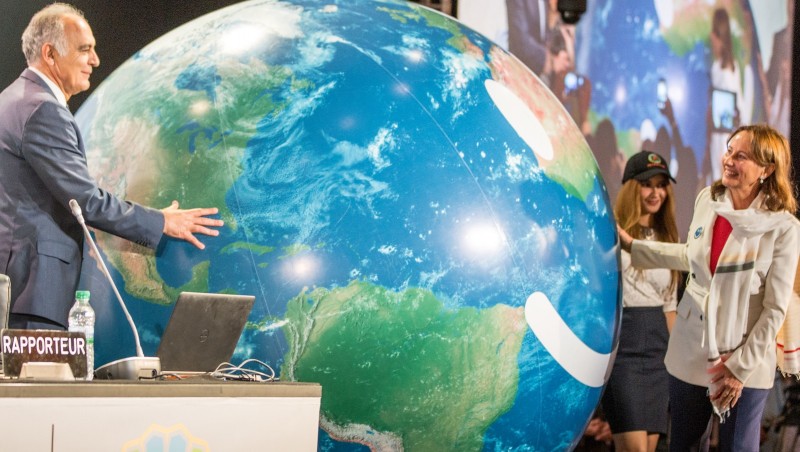At a cozy dinner on Monday night in Marrakech, a group of the climate’s diplomatic heavyweights discussed their response to the possibility of Donald Trump withdrawing the US from the UN’s climate process.
Ministers and representatives from major economies – the EU, Germany, UK, Brazil, Mexico and France – joined roughly a dozen smaller countries at the meal.
US lead climate negotiator Jonathan Pershing also joined the group, which refers to itself as the ‘high ambition coalition’.
Over an hour and a half, the ministers discussed the threat of a US departure – either from the Paris agreement or from the parent UN climate convention.
Their response will likely take the form of a simple, but resounding political statement from as many world leaders as can be mustered. It would reaffirm the global commitment to the Paris deal.
“There is a sense of the meaning and purpose of the high ambition coalition. Now more than ever,” said an EU source.
Ban Ki-moon: Trump must face #climatechange reality, reports @purpleromeropo https://t.co/geDt5j9D5i #COP22 pic.twitter.com/eHg2e0tDS6
— Climate Home News (@ClimateHome) November 15, 2016
This would compliment the ‘Marrakech call’, a more detailed document produced by the Moroccan presidency of the conference.
Trump’s criticism of the Paris deal and intention to damage it is a particular affront to France, in whose capital and through the whose careful diplomacy the deal was struck. Speaking to the conference on Tuesday, French president François Hollande said: “This agreement is irreversible… In law and in fact and in addition in our minds… France will lead the dialogue with the US with determination, perseverance and demands.”
But diplomats are clearly deeply worried. There is a fundamental imbalance between a symbolic reaffirmation of previous climate goals and the nuclear impact a US withdrawal could have on international cooperation.
Two sources told Climate Home that they had heard rumours of an announcement from Trump’s transition team – where climate-sceptic Myron Ebell is leading environment policy – as early as Tuesday afternoon.
Such a move would drop like a bombshell on the talks, in which the US has been a leader during Barack Obama’s presidency. It would also overshadow the visit of secretary of state John Kerry, who will address the meeting on Wednesday.
“It would lack some elegance,” said the EU source, to not allow Kerry the opportunity to depart the climate talks with dignity before the new administration made its policy direction clear.
The same source said the EU’s climate commissioner Miguel Arias Cañete had met with representatives from China and India and both had expressed their desire to move forward, even without the US.
This is notable, given India’s leadership has made no public statements regarding the impact of Trump’s election on the process.
Amid talk here in Marrakesh that Trump won't pull out of climate deal, his spokesman reiterated that pledge Monday. https://t.co/admPH5RwbI pic.twitter.com/vrnvbyUTjC
— Amy Harder (@AmyAHarder) November 15, 2016
On Thursday the “high ambition coalition” plans to call for countries to sign up to one or more of a list of pledges that will step climate action forward in the coming years.
These include ratifying the Paris deal if they have not yet done so, signing up to tougher timelines under the Kigali deal on hydrofluorocarbons (HFCs) and working to implement an aviation emissions deal agreed in October.
Their attempt to influence the direction of the talks by creating an in-group of nations that are aligned to stronger action is a repeat of their role at the Paris talks last year.
The stigma of being in the out-group was effective in Paris, corralling more than 100 nations into a call for more ambitious targets. The group, which is convened by the Marshall Islands, have met in secret on the side of UN conferences since the middle of 2015.
